Let’s do crimes!
Night in the Woods is the first video game I’ve played since being given a Nintendo Switch. Before that my experience was based in the Tomb Raider, Civilization, Prince-of-Persia-on-floppy-disk computer game days. Little did I know this gift was really an elaborate trap by my brother-in-law to have me write for this blog he was relaunching. Bribe accepted, so here we are.
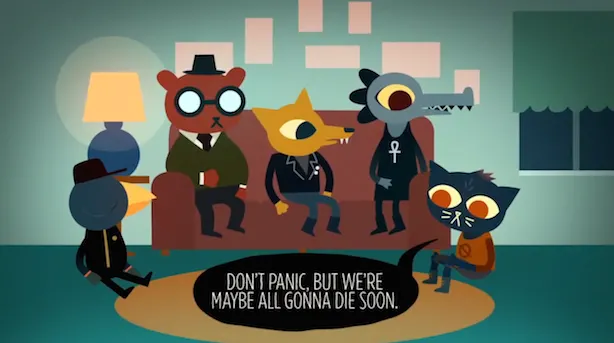
I enjoyed this game so much. And was shocked when I finished it in less than 48 hours, and yes, I did go to work both of those days. The storytelling felt relatable and fresh, decidedly millennial but in a good way. The game begins with your character Mae (a moody college cat) arriving back home to Possum Springs, where vibes are off. Your parents forgot which day you were arriving so you must traverse some spooky woods to get home. This is your first chance to really test out how the game controls. Mostly, you jump.
Pretty quickly you meet your high school friends, who are all busy working at local stores, while you bum around feeling sorry for yourself. The characters are relatable and I’m happy to be friends with them. It was tough picking between two conversation choices when both are tone deaf and shitty. But Mae is a self-involved 20-year-old, so it made sense. Her friends Bea, Gregg, and Angus all have more redeeming qualities, but that may not be far off from how most people view themselves. Not me though, I’m the best. The game is designed in a way where you don’t get to complete all the adventures in one run through, which bothered me.
The town of Possum Springs is crumbling after industrial collapse and references to the working class struggles of the residents are skillfully interwoven through the plot. Parents worry about mortgages, Mae’s friends appropriately give her a hard time about lamenting college when they didn’t have a chance to go, and stores are closing all around them. The strolls through the town are bleak; foreclosure signs, statues dedicated to defunct factory bosses, overheard conversations of workers HOPING to get a job at the new Walmart equivalent. The game also weaves in historical context of the town’s struggles. You learn about the previous fights led by the miners and that Mae’s grandfather fought against the bosses. There’s an ever present mural of the town’s history that demonstrates that fight as well. These touches add depth to the story and the characters.
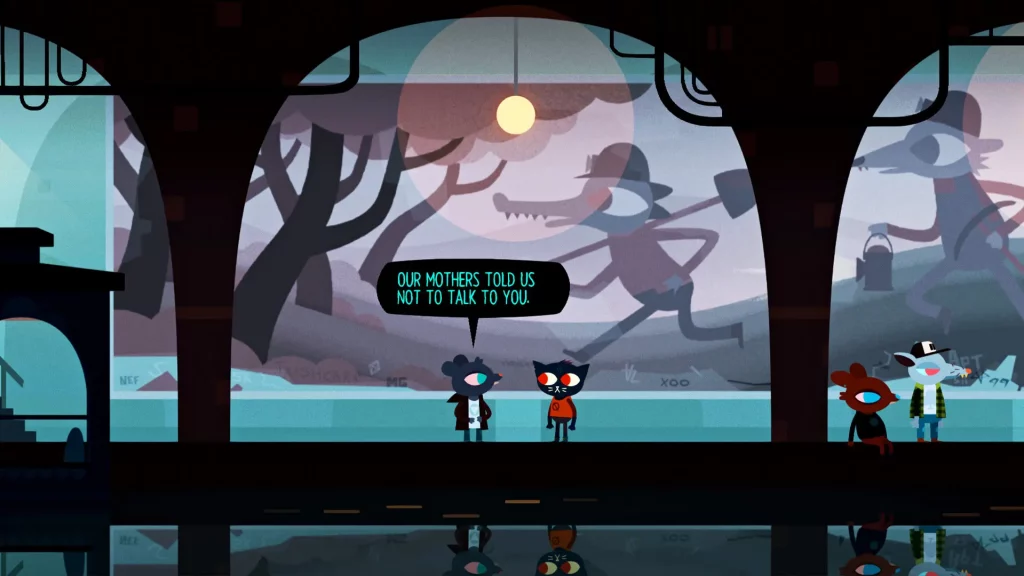
Coupled with those depressing aspects, there are moments that present multi-dimensional workers, making their plights all the more empathetic. The game has rooting-for-the-working-class vibes, as characters demonstrate hidden talents: the handyman from the opening scene later masterfully recites Shakespeare at the Fall Festival; a childhood neighbor, Selmers is a gifted poet; Angus is good with technology. Mae however is kind of a bum, but the allusions to her recent mental breakdown shed some light on why she’s not as active. She does play bass in a band with her friends, but when I do it, terribly. By far the hardest part of the game, and one I didn’t return to often out of frustration.
With the intro and the initial setup of the story (local kid has gone missing), I expected the game to be scarier. But there was still enough of a mystery to keep me engaged and worried. Perhaps the scariest part was Bea having to work at that hardware store for the rest of her life to support her father, or when Mae got drunk at a party and ran into her ex. Also the risk of dying in the woods – crossbows may have been involved.
Relationships are at the core of the storytelling. Which normally does not sound appealing to me. Like whenever a movie is described as having “heart.” No thank you. But part of what’s endearing about Night in the Woods is that it’s so relatable and there’s real character development. The brief bonding moments between Mae and her parents echoed my trips home too well. Bonding with dad by hopping on the couch and watching a show before bed, and mom being concerned in the afternoon about why you’re so tired all the time when you’re not even doing anything productive. “Are you pregnant?”
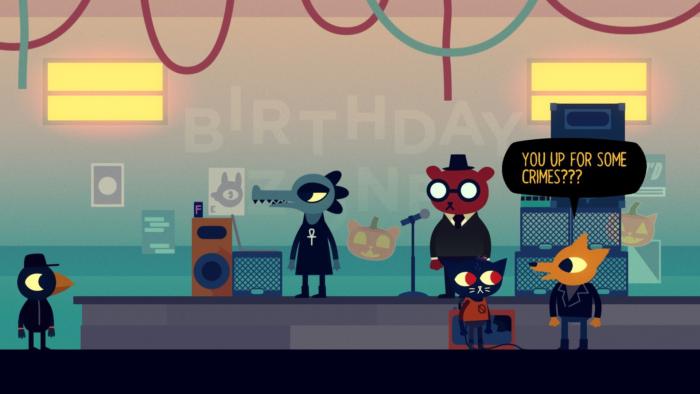
This game is also straight up fun at points! You get to shoplift at a stand-in for Hot Topic, prank mall goers with blasphemous sayings from the intercom, and engage in some light property destruction with Gregg. When making plans for the night, he just says “Let’s do crimes!” and off we go. I felt delighted, like I was getting into shenanigans with high school friends, with all the same devil-may-care attitude I once possessed. Pure glee. The punk attitude towards society and death in this game contrasts cutely with the real-life ennui of the characters’ life under capitalism. When you find a severed arm and decide to poke it with a stick, you can get extra points for also poking the cockroach running around. These kids don’t seem phased by much. And yet I found myself really rooting for all of them! They bring different charms to the game, and it’s apparent the superstores and the factory bosses are the only ones to hate here.
The dialogue was my favorite part, which is good considering it’s much of the game. (Mae isn’t out here doing anything more complex than jumping on telephone wires and roofs.) I found myself wanting to share lines with people because I was so delighted, and because some of the societal critiques were so sharp and poignant. But I was playing alone, and who really wants to hear you explain out of context, or in context, lines from a cartoon cat in a game you liked at 2am in your apt? You guys do though, right?
The actual gameplay can be quite slow at times, but the idyllic music and pacing can also be relaxing albeit a tad boring. I wished at times that Mae could run faster, but no one is in a rush in Possum Springs. The side quests such as shoplifting and baseball bat bashing are pretty easy to master, but still fun because you don’t want to get caught. Whereas I dreaded every time we had band practice, my bass playing was brutal.
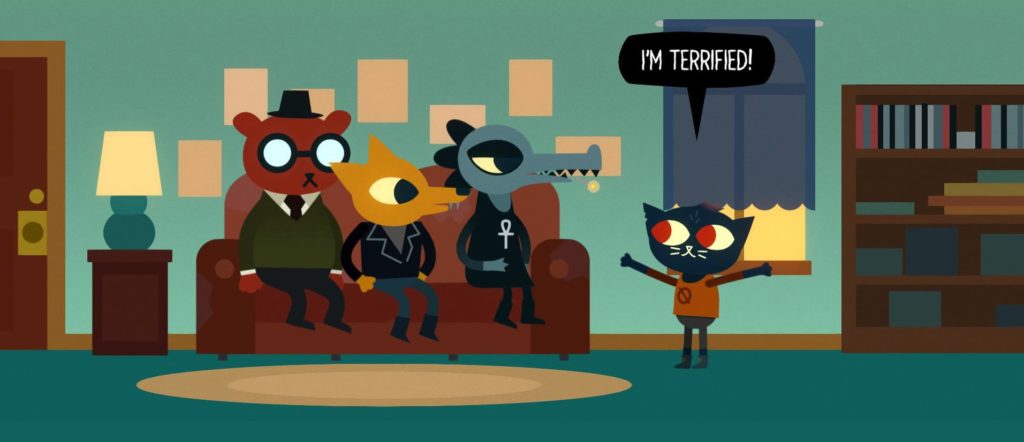
The details were really well done, I found myself nodding along to their choices: the local city council arguing over bullshit, the navy recruiter that stops Mae and implies she may need some direction in her life, Mae mentioning that many of her high school friends joined the armed services to pay for college, the constant comments referring to Mae as a kid (by adults, whom she corrects) and an old lame adult by the teenagers. She really encapsulates that awkward stage in life where you think you know everything while also not fitting into adult society yet. The old school computer screen Mae uses to instant message her friends felt like a fun throwback. And I looked forward to daily newspaper headlines, such as ‘Secretary of Education: “Having public schools is like having public hamburgers. That’s insane. Everyone should buy their own hamburgers.” This headline made me chuckle wryly, and this came out before Betsy Devos.
There were some choices that I found odd or contradictory. The inclusion of Mae’s aunt who is a cop felt off to me, in a game that seems to support strikes and a history of fighting back against the bosses. Cops have historically been used to suppress workers’ movements and break strikes. Granted, Mae is not a huge fan of her cop aunt and treats her with disdain or disinterest but Mae is also fairly unlikeable most of the time, so even these interactions lend themselves to show just another aspect of her being naive or a brat. In reality, the tone of the story would lead me to think that the cop would be presented as another bad guy and not so harmless. But they go so far as to show her as supportive and level headed when she is concerned about Mae’s safety. The story has religious elements that, for me personally, are pretty boring and really took me out of the parts of the story I liked the most. I can sort of understand that for Mae, part of figuring out her place in the universe would involve some spiritual searching, but I found those side stories in particular fairly dull. And for her mom’s job to be at the church and for the pastor to also have some significant screen time struck me as strange for a game with more punk undertones.
Aesthetically, I loved the clothes and hair of the characters and that they were all different animals. Mae’s eyes unnerved me at first but then I grew to love them. She even points out that they are NIGHTMARE EYES, while getting ready to go to a party in the woods. She’s not wrong. Especially as the story becomes more unhinged and dangerous.
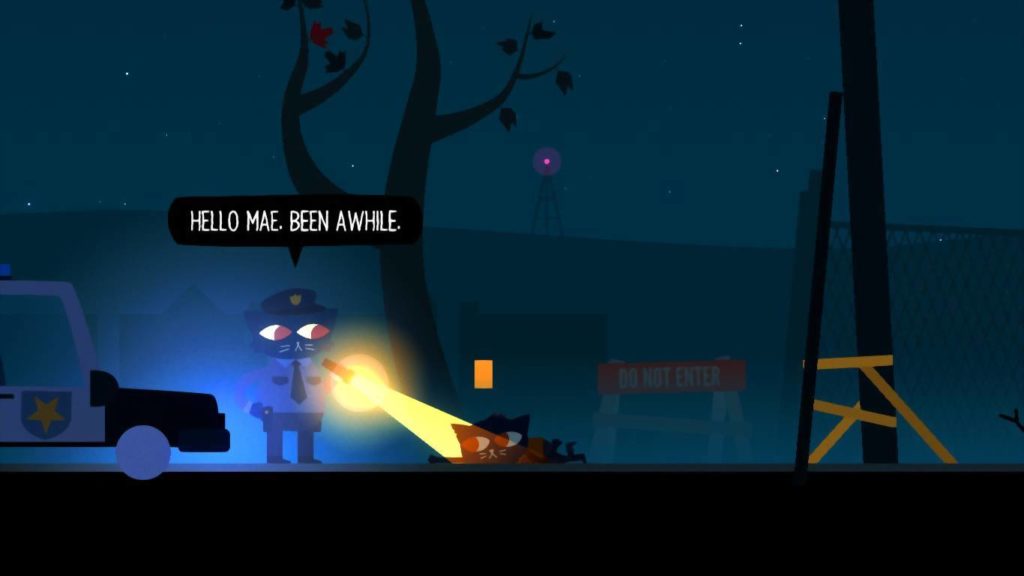
Overall, I was a little unimpressed with the ending in terms of the mystery, although it did quickly ramp up the danger. It was mainly scary because what this game does best is really make me root for Mae’s friends, and you realize they really are just these young people trying to make their way and have some fun. And they’re charming! Gregg seems so silly, but he really supports Mae and his enthusiasm is infectious. And he and Angus’s relationship is sweet. Bea is sharp witted and strong, and her sarcasm is jarring at first but refreshing. You also feel so bad for the hand she’s been dealt, but confident that she is going to be okay, and try to make the world better. I definitely recommend this game, and am hoping to play it through again soon. It’s simple but very charming, and I’d love to see a sequel of where these characters are now. Hopefully organizing a union or walkout together. Miss you already Gregg!

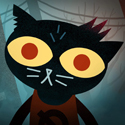
If you are interested in more story driven games that tackle the destructive and depersonalizing elements of late stage capitalism, I would recommend taking the time to play Kentucky Route Zero rather than replaying this. I enjoyed Night in the Woods, but KR0 might be better and is much more alienating, which I think improves it given the subject matter.
Arguably Disco Elysium belongs in a conversation about these themes as well. It is a different type of game in a different genre and gives the player some agency over the approach to various economic systems, but overall comes across as pretty skeptical of existing power structures.
I have not played this game yet, but I do want to. I grew up in a fairly rural town where a lot of my classmates didn’t have very high ambitions – and even the ones who did often ended up crashing and burning. Coming home was often an awkward experience, because I wasn’t sure who I might run into, and where they might be at with their life.
On a grander scale – and at the risk of sounding too grandiose – I wonder how much the game is a commentary on the odd push and pull that Millenials feel as they grow up and try (and maybe fail?) to make it on their own. There’s a lot going against them from an economic standpoint…
But even from a mental health standpoint, I have a pet that Millenials are one of the earliest generations to really understand the concept of Mental Health, who can recognize the generations of trauma that families often inflict upon each other, and are at least trying to break the cycle. Of course, it’s easier said than done, and it sounds like that might be reflected in the game.
In any case, thank you for this review. It gave me a lot to think about.
The vibes are SO OFF. This is the perfect description of rolling up to Possum Springs.
[…] Night in the Woods is a good companion to Disco Elysium. They have a lot of political overlap but present themselves very differently (tonally different, both include lots of people/animals standing around speaking). I could see someone arguing the grittier realism of Disco Elysium is a superior way to discuss hard political realities, but the accessibility and relatability of the characters from Night in the Woods dying post-industrial Possum Springs successfully convey working class angst despite being brightly colored animals. Like Disco Elysium, it’s also a very funny game. Are you ready to laugh? […]